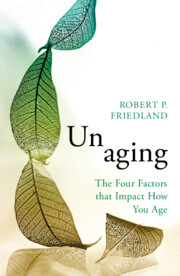Book contents
- Unaging
- Reviews
- Unaging
- Copyright page
- Dedication
- Contents
- List of Figures and Tables
- Preface
- Part I Foundations: What Do We Need to Know about Optimal Aging?
- 1 Aging Is Not Inevitable, It Is an Opportunity
- 2 The Theory of the Multiple Reserve Factors
- 3 The Brain Is Not an Organ, It Is the Master
- 4 Memory and Cognition
- 5 The Neurodegenerative Diseases of Aging
- 6 Stroke and Vascular Cognitive Impairment
- 7 Other Dementias
- 8 Our Microbiota and How to Do Gene Therapy in the Kitchen
- 9 The Health of the Body and the Physical Reserve Factor
- 10 Depression, Anxiety, and What Good Is Feeling Bad?
- 11 Genetics Aren’t Everything
- Part II Applications: What Can We Do about the Opportunity of Aging?
- Part III Conclusions
- Acknowledgments
- Glossary
- References
- Index
1 - Aging Is Not Inevitable, It Is an Opportunity
from Part I - Foundations: What Do We Need to Know about Optimal Aging?
Published online by Cambridge University Press: 15 September 2022
- Unaging
- Reviews
- Unaging
- Copyright page
- Dedication
- Contents
- List of Figures and Tables
- Preface
- Part I Foundations: What Do We Need to Know about Optimal Aging?
- 1 Aging Is Not Inevitable, It Is an Opportunity
- 2 The Theory of the Multiple Reserve Factors
- 3 The Brain Is Not an Organ, It Is the Master
- 4 Memory and Cognition
- 5 The Neurodegenerative Diseases of Aging
- 6 Stroke and Vascular Cognitive Impairment
- 7 Other Dementias
- 8 Our Microbiota and How to Do Gene Therapy in the Kitchen
- 9 The Health of the Body and the Physical Reserve Factor
- 10 Depression, Anxiety, and What Good Is Feeling Bad?
- 11 Genetics Aren’t Everything
- Part II Applications: What Can We Do about the Opportunity of Aging?
- Part III Conclusions
- Acknowledgments
- Glossary
- References
- Index
Summary
For most of human history few people got to be old. Older persons are not as well pepared to face stresses as younger persons because of evolutionary factors. So, it is necessary for older persons to consider the effects of their lifestyle choices on their ability to age successfully. Awareness of these factors is important for our appreciation of the impact which our activities have on our aging. For most of the past 100,000 years of human history we were living in a different environment than the one we have today. The genes we have now were chosen through natural selection because they enhanced the survival of our ancestors who were living in these different environments. This view provides valuable insights into the role environmental factors have in determining maintenance of function with aging. This chapter presents the vital perspective that what we do affects the accomplishment of our goals for aging. These goals must go beyond survival and avoidance of disease and also strive for maintenance of the highest level of fitness and resistance to loss of function (reserve capacities) so that we can resist the declines with aging, as well as the challenges which inevitably occur.
Keywords
Information
- Type
- Chapter
- Information
- UnagingThe Four Factors that Impact How You Age, pp. 3 - 24Publisher: Cambridge University PressPrint publication year: 2022
